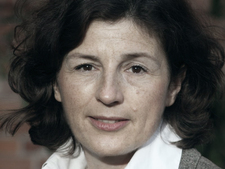-
Topics
subnavigation
Topics
Electromagnetic fields
- What are electromagnetic fields?
- Static and low-frequency fields
- Radiation protection relating to the expansion of the national grid
- High-frequency fields
- Radiation protection in mobile communication
Optical radiation
Ionising radiation
- What is ionising radiation?
- Radioactivity in the environment
- Applications in medicine
- Applications in daily life and in technology
- Effects
- What are the effects of radiation?
- Effects of selected radioactive materials
- Consequences of a radiation accident
- Cancer and leukaemia
- Genetic radiation effects
- Individual radiosensitivity
- Epidemiology of radiation-induced diseases
- Ionising radiation: positive effects?
- Risk estimation and assessment
- Radiation protection
- Nuclear accident management
- Service offers
-
The BfS
subnavigation
The BfS
- About us
- Science and research
- Laws and regulations
- BfS Topics in the Bundestag
- Links
Paulini in favour of fact-based discourse on radiation risks
BfS-President opens joint Conference of ICNIRP and ICRP in Neuherberg
Inge Paulini, President of the Federal Office for Radiation Protection (Bundesamt für Strahlenschutz, BfS) campaigned for a fact-based discourse about radiation risks during an international radiation protection conference on 9 November 2017 at BfS Munich. "All of us have a responsibility to discuss potential risks in an honest, open and comprehensible way without creating unnecessary concern. As reliable partners in scientific and public debates, we should support discourses based on scientific facts and not on fear"
, she emphasized at the opening of an event of the International Commission on Radiological Protection (ICRP) and the International Commission on Non-Ionizing Radiation Protection (ICNIRP) on Wednesday at BfS in Neuherberg near Munich.
Paulini underlined that this was of major importance regarding current social challenges: "Digitisation and the transition to a CO2-neutral energy supply system affect almost every aspect of our society, and the same also applies for electromagnetic fields, which are closely linked to these developments."
With regard to medicine, Paulini added that the justification of specific uses of radiation in diagnostics and therapy would not only involve the question of scientific feasibility, but also ethical issues. In fact, the highest individual radiation doses incurred by humans are produced during the treatment of life-threatening diseases using radiation therapy said Paulini. The BfS was prepared to face these topical challenges.
Radiation from household appliances, the sun, an X-ray device or even a nuclear reactor are not different in their physical properties. They all belong to the electromagnetic spectrum and are characterized by frequency and wavelength. Differences refer to the energy transferred and thus also to the effects: if the radiation energy is so high that it causes ionisation processes when interacting with substances attached to atoms and molecules, it is referred to as ionising radiation, such as with X-rays. Ionising radiation can be harmful to humans. Radiation energy that is not sufficient to cause ionisation is referred to as non-ionising radiation.
The purpose of the joint Conference of ICRP and ICNIRP was, among others, to identify what the different types of radiation and the related scientific disciplines have in common and what separates them, and to strengthen cooperation. "Radiation protection safety can be improved worldwide when the two fields learn from one another while approaches and standards pertaining to ionising and non-ionising radiation are harmonised at the same time"
, emphasized Paulini.
Background
The International Commission on Non-Ionizing Radiation Protection (ICNIRP) is an interdisciplinary international expert body officially recognized by the WHO. Its tasks involve, among others, to evaluate the state of scientific knowledge on the health effects of radiofrequency fields and to use this basis to establish recommendations for the protection against health risks from these fields.
The International Commission on Radiological Protection (ICRP) is an advisory body which makes its recommendations available to regulatory authorities and advisory offices by formulating basic principles for appropriate radiological protection. The Commission has regularly issued recommendations on the protection against the hazards of ionising radiation since its formation in 1928.
State of 2017.11.09




